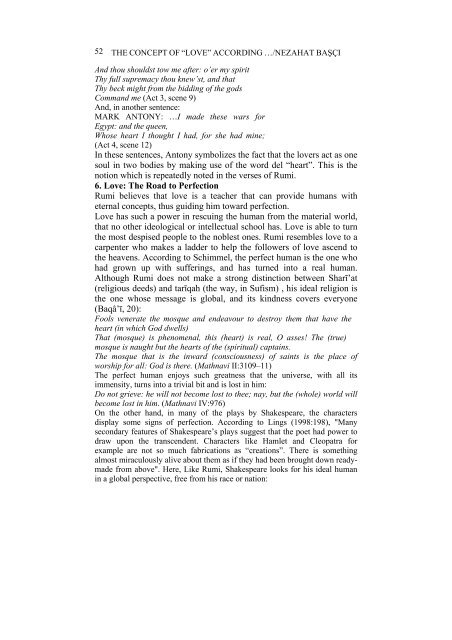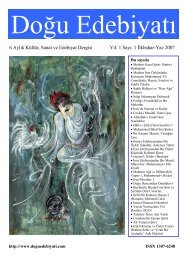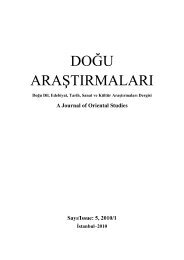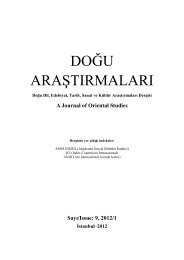A Journal of Oriental Studies Sayı/Issue - Doğu Edebiyatı
A Journal of Oriental Studies Sayı/Issue - Doğu Edebiyatı
A Journal of Oriental Studies Sayı/Issue - Doğu Edebiyatı
You also want an ePaper? Increase the reach of your titles
YUMPU automatically turns print PDFs into web optimized ePapers that Google loves.
52<br />
THE CONCEPT OF “LOVE” ACCORDING …/NEZAHAT BAŞÇI<br />
And thou shouldst tow me after: o’er my spirit<br />
Thy full supremacy thou knew’st, and that<br />
Thy beck might from the bidding <strong>of</strong> the gods<br />
Command me (Act 3, scene 9)<br />
And, in another sentence:<br />
MARK ANTONY: …I made these wars for<br />
Egypt: and the queen,<br />
Whose heart I thought I had, for she had mine;<br />
(Act 4, scene 12)<br />
In these sentences, Antony symbolizes the fact that the lovers act as one<br />
soul in two bodies by making use <strong>of</strong> the word del “heart”. This is the<br />
notion which is repeatedly noted in the verses <strong>of</strong> Rumi.<br />
6. Love: The Road to Perfection<br />
Rumi believes that love is a teacher that can provide humans with<br />
eternal concepts, thus guiding him toward perfection.<br />
Love has such a power in rescuing the human from the material world,<br />
that no other ideological or intellectual school has. Love is able to turn<br />
the most despised people to the noblest ones. Rumi resembles love to a<br />
carpenter who makes a ladder to help the followers <strong>of</strong> love ascend to<br />
the heavens. According to Schimmel, the perfect human is the one who<br />
had grown up with sufferings, and has turned into a real human.<br />
Although Rumi does not make a strong distinction between Sharī’at<br />
(religious deeds) and tarīqah (the way, in Sufism) , his ideal religion is<br />
the one whose message is global, and its kindness covers everyone<br />
(Baqâ’ī, 20):<br />
Fools venerate the mosque and endeavour to destroy them that have the<br />
heart (in which God dwells)<br />
That (mosque) is phenomenal, this (heart) is real, O asses! The (true)<br />
mosque is naught but the hearts <strong>of</strong> the (spiritual) captains.<br />
The mosque that is the inward (consciousness) <strong>of</strong> saints is the place <strong>of</strong><br />
worship for all: God is there. (Mathnavi II:3109–11)<br />
The perfect human enjoys such greatness that the universe, with all its<br />
immensity, turns into a trivial bit and is lost in him:<br />
Do not grieve: he will not become lost to thee; nay, but the (whole) world will<br />
become lost in him. (Mathnavi IV:976)<br />
On the other hand, in many <strong>of</strong> the plays by Shakespeare, the characters<br />
display some signs <strong>of</strong> perfection. According to Lings (1998:198), "Many<br />
secondary features <strong>of</strong> Shakespeare’s plays suggest that the poet had power to<br />
draw upon the transcendent. Characters like Hamlet and Cleopatra for<br />
example are not so much fabrications as “creations”. There is something<br />
almost miraculously alive about them as if they had been brought down readymade<br />
from above". Here, Like Rumi, Shakespeare looks for his ideal human<br />
in a global perspective, free from his race or nation:





